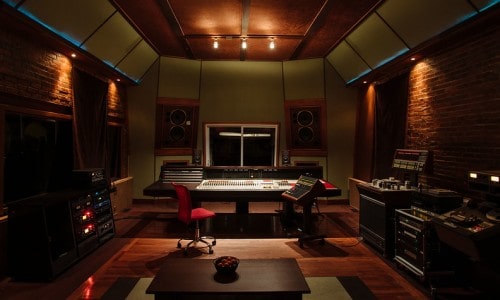
ON THIS PAGE
-
- How to Start a Record Label
- 15 Steps To Start a Record Label Business
- How big is the Record Label industry?
- What are the Key Segments of the Record Label Industry?
- What External Factors Affect the Record Label Industry?
- Who are the Key Competitors in the Record Label Industry?
- What are the Key Customer Segments in the Record Label Industry?
- What are the Key Costs in the Record Label Industry?
- What are the Typical Startup Costs for a New Record Label?
- Recording Studio Setups
- Helpful Videos
- Additional resources in the Record Label market
How to Start a Record Label
If you’re looking to start a Record Label, you’ve come to the right place. Since we’re going to show you exactly how to do it.
We’ll start with key Record Label industry fundamentals like how big the market is, what the key segments are, and how revenues and profits are generated.
Then we’ll discuss keys to not only starting a Record Label, but succeeding in it!
Importantly, a critical step in starting a record label is to complete your business plan. To do this, you should download Growthink’s Ultimate Record Label Business Plan Template here.
15 Steps To Start a Record Label Business:
Starting a record label business can be very profitable. With proper planning, execution and hard work, you can enjoy great success. Below you will learn the keys to launching a successful record label business.
1. Choose the Name for Your Record Label Business
The first step to starting a record label business is to choose your business’ name.
This is a very important choice since your company name is your brand and will last for the lifetime of your business. Ideally you choose a name that is meaningful and memorable. Here are some tips for choosing a name for your record label business:
- Make sure the name is available: Check your desired name against trademark databases and your state’s list of registered business names to see if it’s available. Also, check to see if a suitable domain name is available.
- Keep it simple: The best names are usually ones that are easy to remember, pronounce, and spell.
- Think about marketing: Come up with a name that reflects the desired brand and/or focus of your record label business.
2. Determine the Type of Record Label Business You Will Launch
When determining the type of record label business you will launch, consider several factors, including your musical interests, target audience, industry trends, and your overall vision for the label.
Here are some common types of record label businesses you can consider:
- Independent Record Label: An independent record label focuses on signing and promoting independent artists and bands. It often operates on a smaller scale compared to major labels but offers artists creative freedom and a more personal approach.
- Genre-Specific Record Label: Specialize in a specific music genre, such as hip-hop, rock, electronic dance music (EDM), country, jazz, or classical. This allows you to establish a niche and build a dedicated fanbase within that genre.
- Local or Regional Record Label: Concentrate on discovering and promoting local or regional talent from a specific geographic area. This approach can help support local music scenes and foster a sense of community.
- Subsidiary or Imprint Label: Create a subsidiary label or imprint under an existing record label, focusing on a particular genre or style within the parent company’s portfolio.
- Digital-Only Record Label: Embrace the digital era by operating a label that exclusively releases music through online platforms and streaming services. This model is often associated with smaller overhead costs.
- Vinyl Record Label: Cater to vinyl enthusiasts by producing and releasing music on vinyl records. Vinyl labels appeal to collectors and audiophiles who appreciate the tactile and analog experience of vinyl.
3. Develop Your Record Label Business Plan
One of the most important steps in starting a record label business is to develop your record label business plan. The process of creating your plan ensures that you fully understand your market and your business strategy. The plan also provides you with a roadmap to follow and if needed, to present to funding sources to raise capital for your business.
To enhance your planning process, incorporating insights from a sample record label business plan can be beneficial. This can provide you with a clearer perspective on industry standards and effective strategies, helping to solidify your own business approach.
Your business plan should include the following sections:
- Executive Summary: This section should summarize your entire business plan so readers can quickly understand the key details of your record label business.
- Company Overview: This section tells the reader about the history of your record label business and what type of record label business you operate. For example, are you an independent record label, digital-only record label, or vinyl record label business.
- Industry Analysis: Here you will document key information about the record label industry. Conduct market research and document how big the industry is and what trends are affecting it.
- Customer Analysis: In this section, you will document who your ideal or target customers are and their demographics. For example, how old are they? Where do they live? What do they find important when purchasing services like the ones you will offer?
- Competitive Analysis: Here you will document the key direct and indirect competitors you will face and how you will build a competitive advantage.
- Marketing Plan – your marketing plan should address the 4Ps: Product, Price, Promotions and Place.
- Product: Determine and document what products/services you will offer
- Prices: Document the prices of your products/services
- Place: Where will your business be located and how will that location help you increase sales?
- Promotions: What promotional methods will you use to attract customers to your record label business? For example, you might decide to use pay-per-click advertising, public relations, search engine optimization, and/or social media marketing.
- Operations Plan: In this section, you will determine the key processes you will need to run your day-to-day operations. You will also determine your staffing needs. Finally, in this section of your plan, you will create a projected growth timeline showing the milestones you hope to achieve in the coming years.
- Management Team: This section details the background of your company’s management team.
- Financial Plan – finally, the financial plan answers questions including the following:
- What startup costs will you incur?
- How will your record label business make money?
- What are your projected sales and expenses for the next five years?
- Do you need to raise funding to launch your business?
Finish Your Business Plan Today!
If you’d like to quickly and easily complete your business plan, download Growthink’s Ultimate Business Plan Template and complete your plan and financial model in hours.
4. Choose the Legal Structure for Your Record Label Business
Next you need to choose a legal structure for your record label business and register it and your business name with the Secretary of State in each state where you operate your business.
Below are the five most common legal structures:
1) Sole proprietorship
A sole proprietorship is a business entity in which the owner of the record label business and the business are the same legal person. The owner of a sole proprietorship is responsible for all debts and obligations of the business. There are no formalities required to establish a sole proprietorship, and it is easy to set up and operate. The main advantage of a sole proprietorship is that it is simple and inexpensive to establish. The main disadvantage is that the owner is liable for all debts and obligations of the business.
2) Partnerships
A partnership is a legal structure that is popular among small businesses. It is an agreement between two or more people who want to start a record label business together. The partners share in the profits and losses of the business.
The advantages of a partnership are that it is easy to set up, and the partners share in the profits and losses of the business. The disadvantages of a partnership are that the partners are jointly liable for the debts of the business, and disagreements between partners can be difficult to resolve.
3) Limited Liability Company (LLC)
A limited liability company, or LLC, is a type of business entity that provides limited liability to its owners. This means that the owners of an LLC are not personally responsible for the debts and liabilities of the business. The advantages of an LLC for a record label business include flexibility in management, pass-through taxation (avoids double taxation as explained below), and limited personal liability. The disadvantages of an LLC include lack of availability in some states and self-employment taxes.
4) C Corporation
A C Corporation is a business entity that is separate from its owners. It has its own tax ID and can have shareholders. The main advantage of a C Corporation for a record label business is that it offers limited liability to its owners. This means that the owners are not personally responsible for the debts and liabilities of the business. The disadvantage is that C Corporations are subject to double taxation. This means that the corporation pays taxes on its profits, and the shareholders also pay taxes on their dividends.
5) S Corporation
An S Corporation is a type of corporation that provides its owners with limited liability protection and allows them to pass their business income through to their personal income tax returns, thus avoiding double taxation. There are several limitations on S Corporations including the number of shareholders they can have among others.
Once you register your record label business, your state will send you your official “Articles of Incorporation.” You will need this among other documentation when establishing your banking account (see below). We recommend that you consult an attorney in determining which legal structure is best suited for your company.
5. Secure Startup Funding for Your Record Label Business (If Needed)
In developing your record label business plan, you might have determined that you need to raise funding to launch your business.
If so, the main sources of funding for a record label business to consider are personal savings, family and friends, credit card financing, bank loans, crowdfunding and angel investors. Angel investors are individuals who provide capital to early-stage businesses. Angel investors typically will invest in a record label business that they believe has high potential for growth.
6. Secure a Location for Your Business
Finding the right space for your record label business is important for creating a productive and inspiring work environment.
Here are some factors to consider when searching for the ideal space:
- Location: Choose a location that is accessible to your target audience, artists, and collaborators. Consider proximity to music venues, recording studios, and other music-related businesses.
- Size: Determine the space requirements for your record label operations, including office space, recording or production studios, storage areas, and common areas. Ensure the space can accommodate your current needs and potential growth.
- Soundproofing: If you plan to have recording studios or music production areas, invest in proper soundproofing to minimize noise interference both within and outside the space.
- Security: Ensure the space has adequate security measures in place to protect valuable equipment, recordings, and intellectual property.
- Accessibility: Choose a space that is accessible to individuals with disabilities and complies with relevant accessibility regulations.
- Parking and Transportation: Evaluate parking availability for employees and visitors. Consider access to public transportation for convenience.
7. Register Your Record Label Business with the IRS
Next, you need to register your business with the Internal Revenue Service (IRS) which will result in the IRS issuing you an Employer Identification Number (EIN).
Most banks will require you to have an EIN in order to open up an account. In addition, in order to hire employees, you will need an EIN since that is how the IRS tracks your payroll tax payments.
Note that if you are a sole proprietor without employees, you generally do not need to get an EIN. Rather, you would use your social security number (instead of your EIN) as your taxpayer identification number.
8. Open a Business Bank Account
It is important to establish a bank account in your record label business’ name. This process is fairly simple and involves the following steps:
- Identify and contact the bank you want to use
- Gather and present the required documents (generally include your company’s Articles of Incorporation, driver’s license or passport, and proof of address)
- Complete the bank’s application form and provide all relevant information
- Meet with a banker to discuss your business needs and establish a relationship with them
9. Get a Business Credit Card
You should get a business credit card for your record label business to help you separate personal and business expenses.
You can either apply for a business credit card through your bank or apply for one through a credit card company.
When you’re applying for a business credit card, you’ll need to provide some information about your business. This includes the name of your business, the address of your business, and the type of business you’re running. You’ll also need to provide some information about yourself, including your name, Social Security number, and date of birth.
Once you’ve been approved for a business credit card, you’ll be able to use it to make purchases for your business. You can also use it to build your credit history which could be very important in securing loans and getting credit lines for your business in the future.
10. Get the Required Business Licenses and Permits
Starting a record label business involves several legal requirements, including obtaining the necessary licenses and permits. The specific licenses and permits you need can vary based on your location, the type of music you intend to produce, and other factors.
Here are common licenses and permits to consider:
- Business License: Obtain a general business license or registration from your city or county government to operate as a legal entity.
- Copyrights and Trademarks: While not a license or permit, registering copyrights for musical compositions and trademarks for your record label name and logo is crucial to protect your intellectual property.
- Music Licensing and Distribution Agreements: Secure licenses for the music you plan to distribute or produce. This may include mechanical licenses for reproducing copyrighted songs, synchronization licenses for music used in films or commercials, and master use licenses for using recorded tracks.
- Music Publishing License (if applicable): If you plan to publish music or handle publishing rights for artists, consider obtaining a music publishing license.
- Performance Rights Organization (PRO) Membership: Join a PRO like ASCAP, BMI, or SESAC to ensure that you receive royalties when your music is performed publicly, such as on radio, in live venues, or on streaming platforms.
- Sound Recording Copyright: Register sound recordings with the U.S. Copyright Office or the relevant copyright authority in your country to protect your recordings.
Depending on the type of record label business you launch, you will have to obtain the necessary state, county and/or city licenses.
11. Get Business Insurance for Your Record Label Business
Other business insurance policies that you should consider for your record label business include:
- General liability insurance: This covers accidents and injuries that occur on your property. It also covers damages caused by your employees or products.
- Auto insurance: If a vehicle is used in your business, this type of insurance will cover if a vehicle is damaged or stolen.
- Workers’ compensation insurance: If you have employees, this type of policy works with your general liability policy to protect against workplace injuries and accidents. It also covers medical expenses and lost wages.
- Commercial property insurance: This covers damage to your property caused by fire, theft, or vandalism.
- Business interruption insurance: This covers lost income and expenses if your business is forced to close due to a covered event.
- Professional liability insurance: This protects your business against claims of professional negligence.
Find an insurance agent, tell them about your business and its needs, and they will recommend policies that fit those needs.
12. Buy or Lease the Right Record Label Business Equipment
To run a record label business effectively, you’ll need several equipment to manage your business.
Here’s a list of essential equipment for your record label:
- Computer and Laptops: High-performance computers for audio production, graphic design, and general business operations.
- Studio Equipment (if applicable): If your record label has an in-house recording studio, you’ll need audio interfaces, microphones, headphones, studio monitors, mixing consoles, and soundproofing materials.
- Musical Instruments: Instruments for recording demos, creating arrangements, and assisting artists during songwriting and production.
- High-Quality Cameras: Cameras and video equipment for creating music videos, promotional videos, and behind-the-scenes content.
- Printers and Scanners: For printing contracts, promotional materials, and other documents.
- Furniture and Office Supplies: Desks, chairs, filing cabinets, and general office supplies for day-to-day operations.
- Storage Solutions: External hard drives, network-attached storage (NAS), or cloud storage for backing up and organizing digital assets.
- Physical Media Duplication Equipment (if producing CDs, vinyl, or other formats): CD duplicators, vinyl pressing equipment, and packaging materials.
The specific equipment you need may vary depending on the scope and focus of your record label business. Invest in quality tools and stay up to date with the latest technologies to help your label succeed in the competitive music industry.
13. Develop Your Record Label Business Marketing Materials
Marketing materials will be required to attract and retain customers to your record label business.
The key marketing materials you will need are as follows:
- Logo: Spend some time developing a good logo for your record label business. Your logo will be printed on company stationery, business cards, marketing materials, and so forth. The right logo can increase customer trust and awareness of your brand.
- Website: Likewise, a professional record label business website provides potential customers with information about the services you offer, your company’s history, and contact information. Importantly, remember that the look and feel of your website will affect how customers perceive you.
- Social Media Accounts: Establish social media accounts in your company’s name. Accounts on Facebook, Twitter, LinkedIn, and/or other social media networks will help customers and others find and interact with your record label business.
14. Purchase and Setup the Software Needed to Run Your Record Label Business
Running a record label business requires various software tools to manage music production, distribution, promotion, finances, and administrative tasks efficiently.
Here are essential types of software for your record label:
- Digital Audio Workstations (DAWs): Industry-standard DAWs like Pro Tools, Logic Pro, Ableton Live, or FL Studio for recording, mixing, and mastering music.
- Virtual Instruments and Plugins: Access virtual instruments and audio plugins for enhancing music production, including synths, drum samples, and effects.
- Music Notation Software: Use notation software like Sibelius or Finale for composing and transcribing sheet music.
- Digital Distribution Platforms: Sign up with digital distribution platforms like DistroKid, TuneCore, or CD Baby to release and distribute music to online stores and streaming platforms.
- Email Marketing Software: Create and manage email marketing campaigns using platforms like Mailchimp or Constant Contact to engage with fans and promote music releases.
- Press Release Distribution Services: Use services like PR Newswire or PRWeb to distribute press releases and announcements to media outlets.
- Music Analytics Tools: Utilize analytics platforms like Spotify for Artists, Apple Music for Artists, and YouTube Analytics to track streaming data and audience engagement.
Choose the software that aligns with your label’s specific needs and budget, and consider staying updated with emerging technologies and industry trends to remain competitive in the music business.
15. Open for Business
You are now ready to open your record label business. If you followed the steps above, you should be in a great position to build a successful business. Below are answers to frequently asked questions that might further help you.
Finish Your Business Plan Today!
If you’d like to quickly and easily complete your business plan, download Growthink’s Ultimate Business Plan Template and complete your plan and financial model in hours.
How Big is the Record Label Industry?
According to IBISWorld, the Record Label industry has been in decline for the past five years, at a rate of -2.9% per year. In spite of this, the industry’s 756 companies had total revenues of $7.3 billion last year.
What are the Key Segments of the Record Label Industry?
Record Labels sell products in physical and digital formats. Physical formats, which include CDs, DVDs, Cassettes, and Vinyl account for almost half of all industry revenue. Digital formats are the second-largest industry segment, followed by Digital singles and albums Streaming services and subscriptions have seen a significant increase in popularity in the past few years, but still account for a much smaller percentage of revenue.
What External Factors Affect the Record Label Industry?
A number of factors affect the performance of the Record Label industry. These drivers include:
Album Sales – Album sales constitute the largest portion of industry revenue; therefore, the industry depends on demand for albums.
Per Capita Disposable Income – Consumers buy more albums when they have more disposable income.
Median Age of the Population – Though all age groups are consumers of music, the industry trend toward digital and streaming distribution appeals to younger audiences. Therefore, a younger median age is better for the industry.
Who are the key Competitors in the Record Label Industry?
The biggest independent record labels are Concord Music Group (CMG) and Sub Pop. Major record labels include Warner Music Group (WMG), Universal Music Group (UMG), and Sony Music Entertainment.
What are the Key Customer Segments in the Record Label Industry?
The largest customer segment for the Record Label market are those aged 35 and up, but is closely followed by those age 18-34.
What are the Key Costs in the Record Label Industry?
Purchases are the largest expense for Record Labels. Purchases can include merchandise for distribution, video production, studio rental, tours, and databases for digital distribution.
Wages are a Record Label’s second-largest expense, in part because of the savvy required to recognize and acquire new talent, and in part due to the high level of skill required record, mix, and master an album.
Marketing is also a significant expense. Independent labels spend a larger proportion of revenue on marketing, simply because they do not have the recognition that major labels have, and they have to work harder to connect with fans.
Other expenses include equipment depreciation, distribution costs, production costs, and legal fees.
Finish Your Business Plan Today!
If you’d like to quickly and easily complete your business plan, download Growthink’s Ultimate Record Label Business Plan Template and complete your plan and financial model in hours.
What are the Typical Startup Costs for a New Record Label?
The one-time costs of starting a Record Label include:
- Licensing and startup legal fees
- Recording equipment purchase or lease
- Instrument purchase or lease
- Studio purchase or lease
- Office equipment and supplies
Ongoing costs:
- Marketing
- Rent and utilities
- Equipment maintenance
- Manufacturing physical albums
- Accounting and legal fees
- Databases for storing digital music
Recording Studio Setups


Helpful Videos
Loren Israel: Contacting Record Labels & Building Relationships in the Music Business | Interview
Do I Need a Record Label? Don Passman explains at ASCAP EXPO
Additional resources in the recording industry market
For additional information on the recording industry, consider these industry resources:
- Recording Industry Association of America: www.riaa.com
- Billboard: www.billboard.com
- International Federation of the Phonographic Industry: www.ifpi.org
- Variety: www.variety.com
- American Association of Independent Music: a2im.org
- Record Label Mavericks: www.recordlabelmavericks.com
Record Label Business Plan Example PDF
Download our record label business plan pdf here. This is a free record label business plan example to help you get started on your own record label plan.
How to Finish Your Record Label Business Plan in 1 Day!
Don’t you wish there was a faster, easier way to finish your business plan?
With Growthink’s Ultimate Record Label Business Plan Template you can finish your plan in just 8 hours or less!
Click here to finish your business plan today.
OR, Let Us Develop Your Plan For You
Since 1999, Growthink’s business plan consulting team has developed business plans for thousands of companies who have gone on to achieve tremendous success.
Click here to see how Growthink’s business planning consultants can create your business plan for you.

 Business Plan Template & Guide For Small Businesses
Business Plan Template & Guide For Small Businesses Record Label Business Plan
Record Label Business Plan Music Industry Business Plan
Music Industry Business Plan